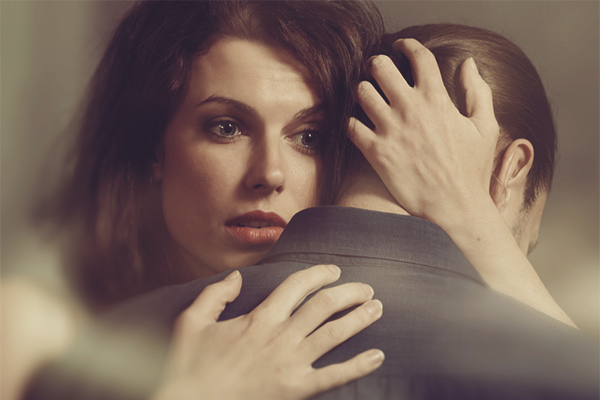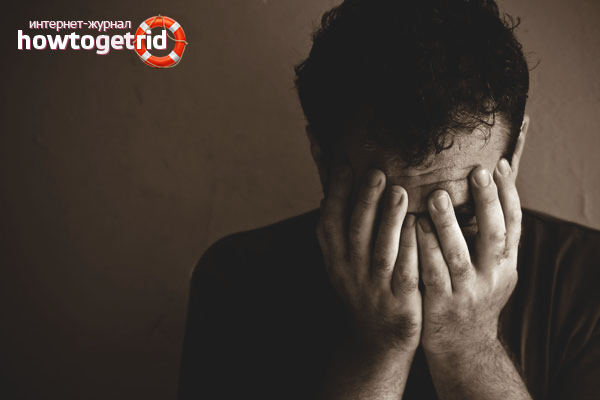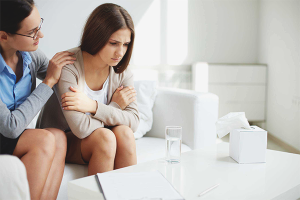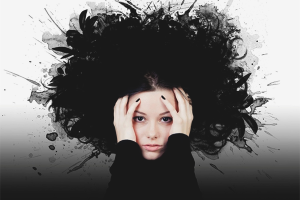The content of the article
Depression is a violation of the psycho-emotional sphere of a person. It is not always that this condition can be described as a disease that needs medical treatment, but sometimes it is impossible to cope with it without the help of specialists. The main thing to notice in time is to understand that your loved one is depressed, because at its initial stages it is much easier to cope with this and protect the patient from the dangers that the disorder can be fraught with.
Causes of depression
The main factor that plays a major role in the appearance of a depressive state refers to negative life changes. But besides this, there are other causes of mental disorder, knowing that you can help a person cope with the illness.
- The loss of a close one provokes a nervous breakdown. As a result of psychological trauma, a person becomes self-contained.In this case, most people overcome difficulties themselves and return to a normal rhythm of life after a certain time. But in some cases, especially in women, the cause of the cause is neurotic depression, which can develop into mental insanity.
- Conflict situations in the immediate environment. The person carries in himself the feelings and thoughts about what happened, overloading the brain, which leads to depression.
- Personal, business and social problems directly affect the onset of depressive symptoms.
- Quite often, a person falls into depression after learning about a serious illness.
- Psychological disorders occur under the action of medications that have side effects.
- Alcohol or drug addiction has an impact on the psyche, leading to manifestations of depression.
- Genetics also plays an important role, passing by inheritance and mental disorder.
Types of depression
Based on the symptoms and causes of mental abnormality in a patient, it is determined what type of depression this is.So, there are several main categories, including chronic depression, otherwise called dysthymia, - can last up to several years; clinical, when all the symptoms are very acute, it is short, but because of the complexity of the flow can have terrible consequences; reactive - arises due to stress and passes quickly enough; neurotic is characterized by increased nervousness and emotional disturbance; alcoholic is manifested in the abrupt refusal of the use of alcohol; lingering in the end will end in indisposition and mild apathy; masked depression is usually the result of disease, as well as postpartum - childbirth; bipolar or manic is fraught with irreversible changes in the patient's mind.
Some types of depression should not cause too much anxiety, they will pass gradually by themselves, and you, your relatives, will quickly forget about this period of life. But others should be alerted, and require the intervention of specialists to prevent the consequences dangerous for life and health. If you notice that a person close to you begins to behave differently than before,if psychosis and nervous breakdowns begin, even to a state of deterioration of well-being, it is better to turn to professionals who will help to identify depression and cope with it in the early stages.
Symptoms of depression
Not every depression is a mental illness. To determine the nature of the disease, you must be able to recognize the clinical signs of a violation of the normal state of a person. In all, the disorder cannot manifest itself in the same way, but there are common symptoms:
- loss of energy, constant feeling of tiredness;
- lack of interest in ordinary affairs and duties;
- pity, sadness, indifference;
- uncontrollable mood changes;
- the need for loneliness, refusal to communicate with others;
- sleep disturbance;
- headaches, lack of or increased appetite;
- self-inconsistency, self-blame, leading to thoughts of suicide.
If a person has at least a few similar symptoms, the diagnosis is obvious - depression.
How to help cope with depression
In addition to the general symptoms, each of the above types of depression has its own specific features, by which one can understand, should involve specialists in the case, or perhaps try to solve the problem on their own.
The key word in defining chronic depression is loneliness. A person no longer needs friends, he feels better alone with himself, becoming isolated in the inner world, often accompanied by alcohol and drugs more feasibly. And under the influence of psychotropic substances, the patient can lay hands on himself.
In the case of clinical depression, a characteristic feeling of depression and nikomunenuzhnosti appears, a person thinks that he has no friends, and all his people around are eager to get rid of him as soon as possible. In this case, the patient winds himself, and such depression can lead to insomnia, loss of appetite, respectively, weight loss and migraines. Show him that he is really dear to you, try to spend more time together, to entice him with joint pastime.
A person who has fallen into a reactive depression begins to pursue persecution, fears and phobias are exacerbated, he often thinks about suicide and may well implement his plan into action. So try to behave carefully and unobtrusively next to him, do not raise your voice and do not make sudden movements, but never leave alone with your thoughts.Such a person is like a small child who can be startled by any careless action.
When neurotic depression, as they say, "nerves naughty." Indeed, the nervous system fails, a person can for no reason begin to cry, scream, or laugh hysterically. It does not matter if there is any significant reason for this. This type of depression is fraught with complications in the form of irrevocable disorder of the central nervous system, but if you provide the patient with a calm environment in time, to protect him from all possible emotional explosions, the disorder will pass in a matter of weeks.
Alcohol depression may well have completely opposite consequences. As a rule, it manifests itself in men who have decided once and for all to do away with alcohol. This decision may be a consequence of the disease, some personal considerations, coercive or voluntary coding. But the longer a person has consumed alcohol, the more difficult it will be to get out of depression. Due to a change in lifestyle and a lack of alcohol in the blood, he begins to feel nauseous, unwell, and there may be a slowdown in motility, anxiety.A person allegedly loses the meaning of life and at the same time wants to say goodbye to his very existence. In this case, it is better to provide the patient in the capable hands of specialists who will help to cope with the psycho-emotional disorder.
A prolonged depression does not pose a threat to life. In this state, a person wants to be alone all the time, he does not trust the people around him, looks for a trick in any word, considers himself worse than everyone else and is engaged in self-digging, looking for reasons why everyone has turned away from him (although this may not correspond at all) reality). As a result, after long weeks of self-pity and tearfulness, indifference and lethargy appear. This type of depression is similar to the clinical one, therefore, it is necessary to “pull” a person out of it in the same way. Give him a little time, then surround him with care and attention, show that you still need him, do not let him go to himself.
Masked depression is the most difficult type of disorder in terms of its diagnosis. In this case, invariably begin various health problems immediately from the nervous and cardiovascular systems, skin and genital organs.The general deterioration of health leads to depression, and in the event of such symptoms, you should immediately seek medical help.
Manic depression is accompanied by constant fear, panic attacks. This can affect the functioning of the heart and the vascular system, lead to tachycardia, and sometimes, in particularly severe cases, to cardiac arrest.
The main rule in the treatment of depression - do not leave the patient alone. Do not let him forget that he is still your friend or loved one, and give him as much attention as possible.













To send